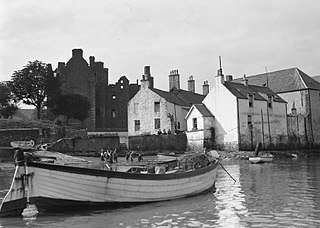Kirkcudbright was a royal burgh that returned one commissioner to the Parliament of Scotland and to the Convention of Estates.

Kirkcudbright, is a town and parish in Kirkcudbrightshire, of which it is traditionally the county town, within Dumfries and Galloway, Scotland.

A royal burgh was a type of Scottish burgh which had been founded by, or subsequently granted, a royal charter. Although abolished in law in 1975, the term is still used by many former royal burghs.

The Parliament of Scotland was the legislature of the Kingdom of Scotland. The parliament, like other such institutions, evolved during the Middle Ages from the king's council of bishops and earls. It is first identifiable as a parliament in 1235, during the reign of Alexander II, when it was described as a "colloquium" and already possessed a political and judicial role. By the early fourteenth century, the attendance of knights and freeholders had become important, and from 1326 commissioners from the burghs attended. Consisting of the "three estates" of clergy, nobility and the burghs sitting in a single chamber, the parliament gave consent for the raising of taxation and played an important role in the administration of justice, foreign policy, war, and all manner of other legislation. Parliamentary business was also carried out by "sister" institutions, such as General Councils or Convention of Estates. These could carry out much business also dealt with by parliament – taxation, legislation and policy-making – but lacked the ultimate authority of a full parliament.
Contents
After the Acts of Union 1707, the commissioner for Kirkcudbright was one of the Scottish representatives to the first Parliament of Great Britain. [1] From 1708 Kirkcudbright, Annan, Dumfries, Lochmaben and Sanquhar formed the Dumfries district of burghs, returning one member between them to the House of Commons of Great Britain.

The Acts of Union were two Acts of Parliament: the Union with Scotland Act 1706 passed by the Parliament of England, and the Union with England Act passed in 1707 by the Parliament of Scotland. They put into effect the terms of the Treaty of Union that had been agreed on 22 July 1706, following negotiation between commissioners representing the parliaments of the two countries. By the two Acts, the Kingdom of England and the Kingdom of Scotland—which at the time were separate states with separate legislatures, but with the same monarch—were, in the words of the Treaty, "United into One Kingdom by the Name of Great Britain".
The Scottish representatives to the first Parliament of Great Britain, serving from 1 May 1707 to 26 May 1708, were not elected like their colleagues from England and Wales, but rather hand-picked.

The 1708 British general election was the first general election to be held after the Acts of Union had united the Parliaments of England and Scotland.